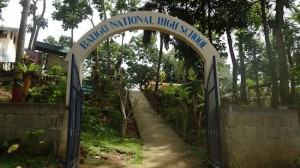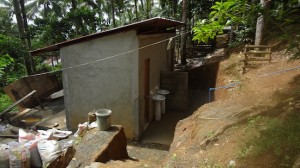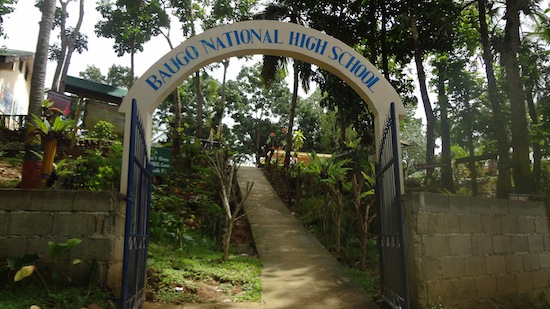 “The children who have no clean water to drink, the women who fear for their safety, the young people who have no chance to receive a decent education have a right to better, and we have a responsibility to do better. All people have the right to safe drinking water, sanitation, shelter and basic services.”
“The children who have no clean water to drink, the women who fear for their safety, the young people who have no chance to receive a decent education have a right to better, and we have a responsibility to do better. All people have the right to safe drinking water, sanitation, shelter and basic services.”
– Ban Ki-moon, UN Secretary General
Baugo National High School formerly known as Baugo Barangay High School is situated on top of a mountain of *Barangay Baugo, 20 kilometers from the city of Maasin, in Southern Leyte Province. In spite of its location, people can commute to the city with some sections of the road being concrete making easier to travel, but some other sections are really bumpy and hazardous in the wet season It was in the year 2010 when the Edmund Rice Christian Brothers were conducting research, consulting various grassroots agencies to find out the real issues affecting the lives of the people, that the poverty and needs of this school came to light.
Even though the school had started in 1977 with the help of Barangay Captain Cipriano Morcen and the Assistant Principal Mrs. Serafia Delima, after 36 years of its existence, the school still lacked basic water and sanitation facilities. When Lynne Moten of Seymour College, Adelaide in Australia visited the Philippines, she saw for herself the real problem that was faced by the students there, particularly the female students. Many girls walk long distances to face a school day from 7:30 am to 5:00 pm and the problem of having of no water or sanitation facility available. Seymour being a girl’s college, took up the issue: Ms. Wendye Koener’s Year 9 Geography class through their unit on Poverty, conducted a research with a special focus on sanitation. Once they had done their research and Lynne had shared with them some photographs of the Baugo School and its needs, the students were motivated to put the research into action. They launched a social action and fundraiser, raising the money required. Edmund Rice Services in Maasin communicated to the school at Baugo the development and the school community organised itself by inviting parents to give voluntary work as their contribution to the project.
The real challenge was, through local advocacy, to build the toilet block (locally known as Comfort Rooms) integrating participation from all quarters. The other was to battle the roads in transporting all the material to the location. Once the materials arrived at the foot of the mountain, all the materials had to be carried with voluntary labor provided by the parents of the school. The water had to be carried for about a kilometre and stored in makeshift containers for the work for the next day. (Out of desperate need, some of the local people would come and use some of the water for their own needs because of the acute shortage of water faced by them.)
Edmund Rice Services staff in support of a letter of request from the Principal of the high school, met the Mayor and the city department, making them aware of this need faced by the people in the hills, the high school youth in particular. The Government department was pleased to collaborate in the venture and provided the transportation facilities, the welding machine to fix the roof and some labor, free of charge. By providing this facility through collaboration, the stakeholders have been able to:
a. Promote positive behavior towards water and sanitation facility-utilization and also hygiene practices in the school;
b. Reduce risk to student health (especially of female students) by freeing them from a situation of having no facility allowing normal functioning of their bodies in the course of the school day;
c. Enhance strategic alliances and partnerships between public and private entities for positive outcomes; and
d. Demonstrate in a small, local way that advocacy resulting from inter and intra-community engagement in support of the dignity of the human person, can put into effect what the United Nations General Assembly has called for: (“On 28 July 2010, through Resolution 64/292, the United Nations General Assembly explicitly recognized the human right to water and sanitation and acknowledged that clean drinking water and sanitation are essential to the realization of all human rights. The Resolution calls upon States and international organisations to provide financial resources help capacity-building and technology transfer to help countries, in particular developing countries, to provide safe, clean, accessible and affordable drinking water and sanitation for all. “ Source: Resolution A/RES/64/292. United Nations General Assembly, July 2010)

Mrs. Elenita Ortega, Principal of Baugo National High School, and the staff and student body of the school, are grateful to Seymour College for their initiative in taking up this cause in Australia, making this facility possible for bringing dignity to each and every student of this rural school in the Philippines. We are grateful to Mr. Julius Cabachete, architect in Maasin City, who patiently monitored the project and ensured the bringing of the project to completion even amidst acute challenges; also to Ms. Eva E. Doron (Development Liaison Officer) who followed up the progress at every stage to make the project a reality.
Thanks to Br Theo Alvares for this article
*A barangay (Filipino: baranggay), also known by its former Spanish adopted name, the barrio, is the smallest administrative division.
